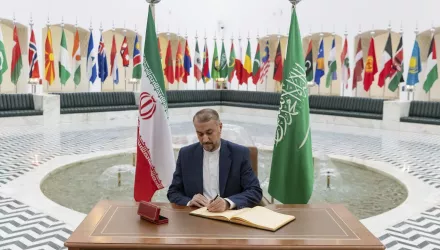NEW YORK -- The visit by Israeli Prime Minister Benjamin Netanyahu this week to the United States and the United Nations General Assembly signals a critical moment in diplomatic developments in the Middle East, including potentially a decisive reckoning in Israeli-American relations. This is because on the important issue of how the United States and the West deal with Iran’s nuclear industry, the trends of both public opinion and leadership sentiments in Israel and the United States are moving in opposite directions.
This occurs at a decisive moment in the region when many countries are in turmoil (Syria, Iraq), some are severely pressured by the turmoil (Lebanon, Jordan), others are in the process of reconfiguring their political systems (Egypt, Tunisia, Libya), Iran is redefining its relations with local and foreign powers, Russia is seeking a larger role in the area, and the United States seeks a lower profile and footprint in the region. Rarely have so many assumptions about how countries and regimes behave across the Middle East been subjected simultaneously to new doubts and great uncertainties.
The policies of Iran and Israel vis-à-vis the United States have been two anchors of these assumptions for decades -- the United States-Israel bond seemingly made of steel, and American-Iranian hostility seemingly embedded permanently in each country’s political chromosomes. Those two critical relationships may be changing, largely due to the Iran factor, and the initial indicators are that this may be putting American-Israeli relations to their most serious test in many decades.
Approximately three-quarters of Americans support President Barack Obama’s diplomatic overtures to Iran that aim to find a peaceful political resolution to the issues that divide the two countries. These include, from the American perspective, Iran’s nuclear capabilities and its intentions in the Middle East, and, from Tehran’s perspective, American- and Israeli-led sanctions that aim to cripple Iran, double standards in applying existing international regulations on the peaceful use of nuclear power, and alleged plans to change the regime in Tehran.
Approximately the same percentage of Israelis doubt the sincerity of the overtures and statements by newly elected Iranian President Hassan Rouhani to the effect that Iran does not want to make a nuclear bomb and is willing to have its nuclear industry placed under strict international supervision. In return, Iran expects sanctions to be lifted, along with an end to foreign attempts to remove the regime from power.
Rarely have American and Israeli public opinion diverged so significantly on such critical issues to both people. On other issues in recent years when the two countries disagreed -- such as Israeli settlements or the pre-1967 borders forming the basis for negotiations -- the Israeli view almost always prevailed, as American officials proved unwilling or unable to budge a determined Israeli leadership. One reason for that is that American public opinion tended to view the American-Israeli dynamics as spectator sport that they watched on television but did not get involved with personally or emotionally.
This time the situation is different, as a large majority of Americans understands that a negotiated and fair agreement with Iran on the issues that matter to both countries is a win-win situation. Such agreement would help the United States avoid getting into another war or unleashing major attacks on Syria or Iran, and would allow Iran to play a stabilizing role in the region. Israelis mostly do not share this view and mistrust Iranian statements as a ruse to remove sanctions and provide Tehran with new opportunities to dominate the region.
It is hard to know ahead of time how Obama will behave, knowing that he has strong public support for his overtures to Iran. The strategic advantages to the United States of a fair deal with Iran are so immense that Obama may well oppose and stare down Netanyahu in a manner that he would not have attempted in other situations, given Netanyahu’s proven ability to manipulate so many members of Congress against the American president. The Israeli prime minister presumably understands that he is dealing with an American president who enjoys a much stronger hand than was the case when these two men disagreed several times in recent years. The American public also seems in no mood to have a foreign zealot manipulate the domestic political system in Washington at a time when that system is in serious disarray over the dysfunctional relationship between the president and the Congress.
This is a rare moment when the issue at hand is not only the fate of Iranian nuclear technology or the strategic interests of the United States. We are perhaps witnessing in the coming months a recalibration of power relationships between the United States and Israel, with Washington for a change pursuing policies in the Middle East that are determined by the national interest of the United States, rather than by the dictates and fears of Israel and its many apologists and lobbyists in Washington, D.C. That would be the kind of birth of a new Middle East that should be welcomed by all, including Israelis.
Rami G. Khouri is Editor-at-large of The Daily Star, and Director of the Issam Fares Institute for Public Policy and International Affairs at the American University of Beirut, in Beirut, Lebanon. You can follow him @ramikhouri.
Khouri, Rami. “A Critical Moment in Israeli-American Relations.” Agence Global, October 1, 2013




